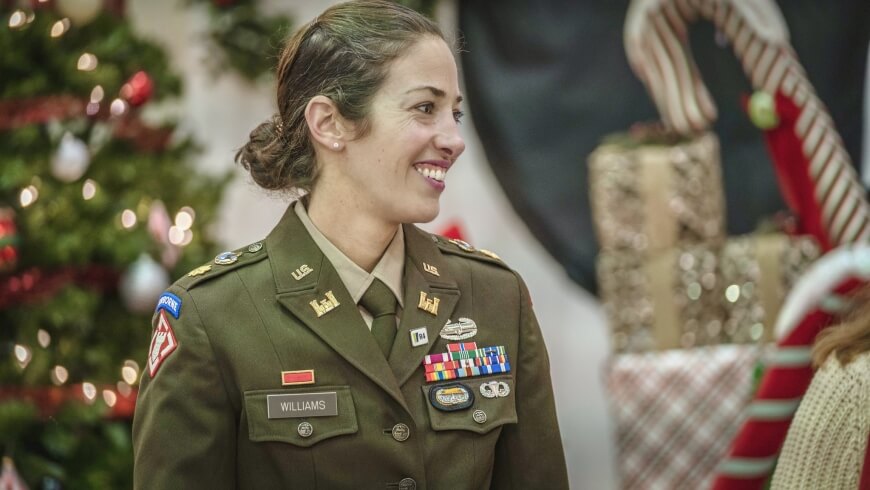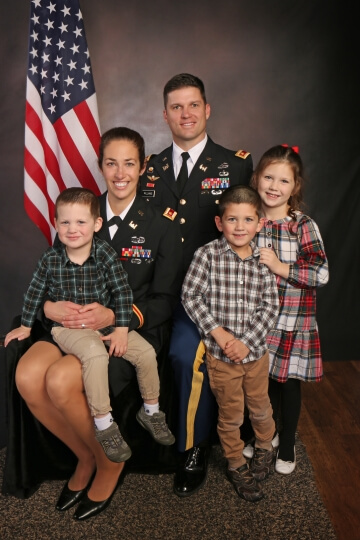News
Erin Williams, S.M. '20
Erin Williams, S.M. '20, didn’t plan on a career in the armed services when she was looking at potential undergraduate institutions. A star high school basketball player from Pennsylvania and daughter of a U.S. Marine Corps Reservist, she originally planned to be a teacher. It wasn’t until the United States Military Academy at West Point invited her on a recruiting trip during her senior year that she began to consider a military career.
“What I liked the most was that there was a lot of structure,” said Williams. “Everybody knew what they wanted to do and had a good glide path to where they wanted to go right after graduation. The people who I met on my visit to West Point were super-high-quality people, and that was something that I felt really attracted to.”
With her father’s encouragement, Williams picked West Point, where she majored in civil engineering. That started her down a path that’s included active deployment in Afghanistan, a master’s degree in engineering management at Missouri University of Science and Technology, returning to West Point as an instructor, and in 2018 joining the first cohort of data science master’s students at the Harvard John A. Paulson School of Engineering and Applied Sciences (SEAS).
Williams is now a division operations research and systems analyst (ORSA) for the Army’s 101st airborne division out of Fort Campbell North in Kentucky.
I get a new problem set every day, and I get the chance to see how the work I do actually changes the organization, changes how people do things, and changes how we manage the resources that we have.
After serving for two years in Afghanistan, where she did everything from highway security to equipment procurement, Williams returned to the U.S. to enroll in the Engineer Captain's Career Course at Fort Leonard Wood in Missouri. She finished her first master’s degree soon after, then spent two years at Fort Campbell, first as Brigade Chief of Operations and then Company Commander.
To get the opportunity to teach in the systems engineering department at West Point, Williams needed additional graduate-level education. Looking for cities where both she and her husband, also an Army officer, could study, Williams eventually discovered the newly announced data science program at SEAS, where she joined the inaugural cohort.
Erin Williams, S.M. '20, with her husband and three children
At SEAS, Williams got a chance to interact with people from different backgrounds and countries. Elective classes on technology policy and the law of war provided new perspectives on the life she’d been part of for nearly a decade.
“The Army calls that time in your career, usually between your seventh and twelfth year, as a flexible, ‘broadening’ window,” she said. “The goal is to get you out of the tactical Army mindset, give you an experience out of your comfort zone, and ask you to think in a different way and consider perspectives that aren’t military-centric. That’s absolutely what I got. My husband and I loved living in Boston, having access to all the culture there, and the people that we met who had such different backgrounds.”
Along with new perspectives came new skills. Williams arrived on campus without any previous coding experience, but learned how to code as part of her SEAS education – so much so that at West Point she was able to teach a course on computer-aided systems engineering, which relied heavily on coding and programming languages.
“Having to learn by doing was pretty impactful for me,” she said. “It’s given me the skill sets to be able to pivot between a few different coding languages, have the flexibility to be able to figure new programs out, and also explain the theories behind things.”
Once she finished at SEAS, Williams spent two years as a systems engineering instructor at West Point before becoming an ORSA at Fort Campbell. As an ORSA, Williams has taken on a number of data and research-related projects,including helping the Army modernize and optimize how it manages data.
“The Army has a lot of authoritative data systems, but is still working to bring all these sources together, and it doesn't have a lot of people on the ground who know how to leverage these systems in an effective manner,” she said. “Organizationally, we are working toward being able to connect all our data in a meaningful way and getting people to use the tools we already have to process their data more efficiently. The thing that our military staff brings is our expertise, understanding and ability to take that data and translate it into potential risks, opportunities and best courses of action.”
The opinions in this story represent Williams alone and should not be taken as official statements from the U.S. Army or Department of Defense.
Topics: Alumni, Data Sciences
Cutting-edge science delivered direct to your inbox.
Join the Harvard SEAS mailing list.
Press Contact
Matt Goisman | mgoisman@g.harvard.edu




